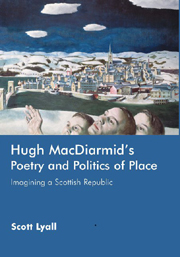Book contents
- Frontmatter
- Contents
- Dedication
- Acknowledgements
- Abbreviations of Works by Hugh MacDiarmid
- A Note on the Text
- Map
- Introduction: Imagining a Scottish Republic
- 1 ‘Towards a New Scotland’: Selfhood, History and the Scottish Renaissance
- 2 Debatable Land
- 3 ‘A Disgrace to the Community’
- 4 At the Edge of the World
- 5 ‘Ootward Boond Frae Scotland’: MacDiarmid, Modernism and the Masses
- Index
Introduction: Imagining a Scottish Republic
Published online by Cambridge University Press: 12 September 2012
- Frontmatter
- Contents
- Dedication
- Acknowledgements
- Abbreviations of Works by Hugh MacDiarmid
- A Note on the Text
- Map
- Introduction: Imagining a Scottish Republic
- 1 ‘Towards a New Scotland’: Selfhood, History and the Scottish Renaissance
- 2 Debatable Land
- 3 ‘A Disgrace to the Community’
- 4 At the Edge of the World
- 5 ‘Ootward Boond Frae Scotland’: MacDiarmid, Modernism and the Masses
- Index
Summary
I once thought I would have done better in London, or Cape Canaveral, or Hollywood even. I had been taught that history was made in a few important places by a few important people who manufactured it for the good of the rest. But the Famous Few have no power now but the power to threaten and destroy and history is what we all make, everywhere, each moment of our lives, whether we notice it or not.
Emerging from his emotional nadir, Jock McLeish reaches this understanding of the centrality of place to his personal growth close to the conclusion of Alasdair Gray's 1982 Janine. By painfully gaining this ultimate acceptance of home, Jock, the Scottish Everyman, signals his willingness to proceed in a realistic yet hopeful manner with his life in actively local terms. Learning to refuse the self-hating escape clause of misogynistic fantasy, for Jock life is positively not elsewhere. The ‘process’ (as Marshall Walker puts it) of Jock's renewal also marks the beginning of the end for the Scottish cringe.
Published in 1984, the anachronistic date of the title relates Gray's novel to the Falklands War of March–June 1982 – a British victory with echoes of imperial grandeur that paved the way for Margaret Thatcher's second-term General Election landslide of 9 June 1983. Jock is at war with himself at the same time as Britain is at war with Argentina for the Falkland Islands, a place he describes as a ‘remote souvenir of the Great Britisher's Empire’.
- Type
- Chapter
- Information
- Hugh MacDiarmid's Poetry and Politics of PlaceImagining a Scottish Republic, pp. 1 - 22Publisher: Edinburgh University PressPrint publication year: 2006



